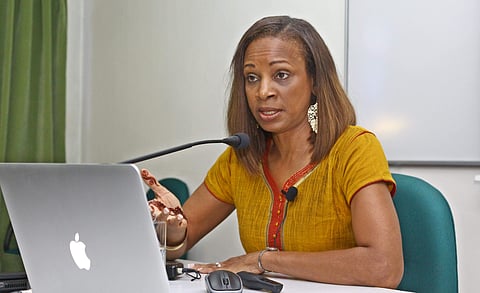

While women form around half the world's population, are their voices, issues, struggles and stories properly represented by the media? We posed the question to Cristal Williams Chancellor, Director of Communications, The Women's Media Center, USA. Chancellor was at the Asian College of Journalism a few days ago, to deliver a talk on The Status of Women in the US News Media.
Unsurprisingly, her answer was "No."
When we caught up with her post the lecture for a quick chat, she had quite a lot to share about the problem with the representation of women and other genders in the media, across channels. These are a few of those rather unconventional, yet hard-hitting views.
Chancellor tells us that US newsrooms are still very male dominant. "Most of the stories are told by men, who form 68 per cent of the media in the US. This gap means that there is an under-representation of women or a misrepresentation of their stories. it happens in every sort of media," she says. She tells us how for a stereotypical female character, her body or beauty is given more prominence, compared to her talent and aspirations. It is difficult to say no to that argument. "It is important that women's stories, experiences and voices are included in the media. The media has to reflect all the voices. If there's no true representation, the media is not credible," she adds.
If women are underrepresented, what about the sexual minorities and others? Undoubtedly, their voices are also not heard. "It is equally important to represent the other genders and also people who are gay and disabled. The media has to tell all these stories. It is important that society recognises them," says Chancellor. She went on to talk about how, traditionally, society in the US is focused on the male voice, particularly the white male voice. "This has to change. The media has to include all the voices and stories," she adds.
In today's age, it is nearly impossible to not come across a social media troll page or meme that is used to defame somebody. Chancellor also spoke about how these create a wrong image in people's minds about issues. "In this age, social media plays a role in shaping your thoughts. Unfortunately, the digital space today is unsafe for women. There's so much hate speech to silence women and make sure their voices aren't included," she says. She tells us about the Women's Media Center's speech project that is dedicated to raise awareness against online abuse. "The web is a space where people do not have to show their identity. Those people are directing other supporters. We're making sure that the media represents all the stories online and that we collectively raise our voices," she concludes.
The lecture was organised by the US Consulate General in Chennai. The consulate, in association with The New Indian Express is holding an essay contest for college and university students in Tamil Nadu, Karnataka, Kerala, Puducherry, and the Andaman and Nicobar Islands. The contest will run from now until August 26. The theme for the essay contest is Portrayal of gender in media and entertainment.
